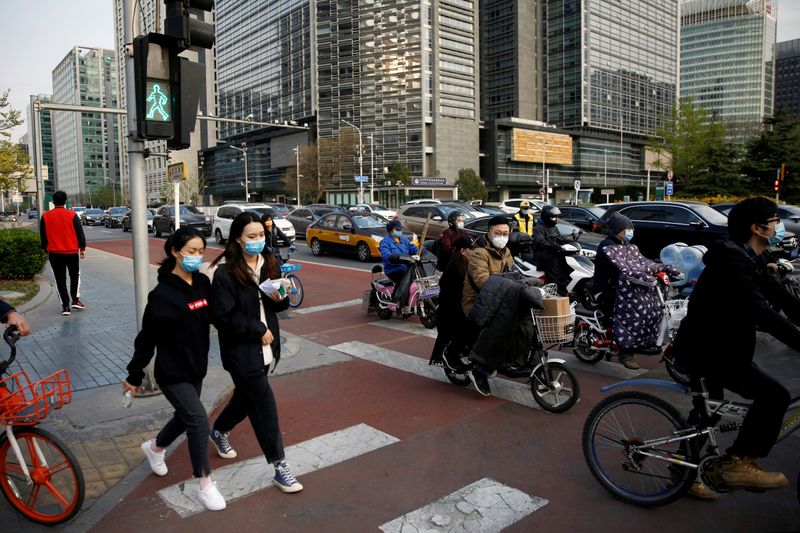By Gabriel Crossley and Cheng Leng
BEIJING (Reuters) - The coronavirus pandemic is expected to cause millions more people in China to lose their jobs, leaving many of them stranded without a safety net, unable to access state unemployment benefits, economists say.
The rapid spread of the disease around the world has dashed hopes for a quick recovery in China, where the virus first emerged. Analysts expect nearly 30 million job losses this year due to stuttering work resumptions and plunging global demand, outpacing the 20-plus million layoffs during the 2008-09 financial crisis.
Beijing has fortified its jobless claims programme in the decade since the financial crisis erupted, tripling the pot of funds to which both employers and workers contribute to 581.7 billion yuan ($82.37 billion), according to the latest data.
But millions of workers have no contracts or have not been paying into the unemployment insurance scheme, meaning they will have to rely on their employers giving them compensation if they get laid off. Many will be forced to dip into savings or seek help from their extended family if they lose their jobs.
Some 2.29 million people received unemployment insurance in January and February, according to the Ministry of Human Resources and Social Security. In the same period, an estimated 5 million people lost their jobs, according to Dan Wang of the Economist Intelligence Unit.
Wang estimates another 22 million people may lose their jobs this year but only half will likely qualify for unemployment benefit, she said.
China's State Council did not respond to a request for comment.
"The rent is high in a city like Beijing, and I don't have any income," said a woman who gave her surname as Xue. The 19 year old was laid off from her job in a nail salon in April but said she wasn't able to claim unemployment insurance because she hadn't worked for long enough.
Workers registered in the system can draw monthly payments for up to two years if they have contributed to the scheme for a decade. The length of the payment decreases with shorter contribution periods.
In Beijing, laid-off workers who have paid into unemployment insurance for long enough can expect up to 1,815 yuan ($257) per month but that is less than half the average wage of a migrant labourer in 2018, according to government data, and is less than the average monthly rent of around 2,500 yuan for a modest room in the Chinese capital.
If they can't claim for unemployment insurance, people with household income below a minimum threshold - ranging from 1,160 yuan ($165) a month in Shanghai to 337 yuan in an impoverished region like Ningxia - can apply for assistance to top up their incomes.
WORKER PROTESTS
The situation is particularly acute for China's roughly 200 million rural migrant workers, who take on labour-intensive jobs for meagre wages and have limited access to public health care. Many of them were shut out of factories and barred from crossing city lines when China locked down large swathes of the country to get the virus under control.
Migrant labourers might have already lost up to $100 billion in wages during the lost working weeks of lockdown earlier this year, one study by researchers at Stanford University estimates.
Labour protests, which almost ground to a halt during the lockdown, have re-emerged with workers who suffered particularly hard due to the clampdown on economic activity, such as taxi drivers, featuring more prominently.
"Given that we are heading towards a deep global recession imminently, businesses closures that result in wage in arrears and failure to pay social insurance contributions will drive labour unrest," said Mimi Zou, a fellow in Chinese law at Oxford University.
Data from China Labour Bulletin, which monitors labour disputes in the world's second largest economy, shows that of 50 collective worker protests in March, half were in the service and transport sectors. Construction workers also protested over compensation, including some who helped build emergency hospitals in Wuhan, the epicentre of the epidemic in China
"The main issues that we're seeing already in terms of worker protests which are beginning to creep up again, again it's mainly work arrears," said Geoffrey Crothall of China Labour Bulletin.
"Workers are simply not being paid, despite government assurances that they should be on the payroll."
In Beijing, a food court employee laid off due to declining sales during the virus outbreak said her contract did not include any unemployment insurance as she was over the female retirement age of 55.
"They didn't fire me because of my performance," said the 56 year old woman, who gave her surname as Wang.

"We're in an epidemic, everybody's livelihoods are all at great risk."